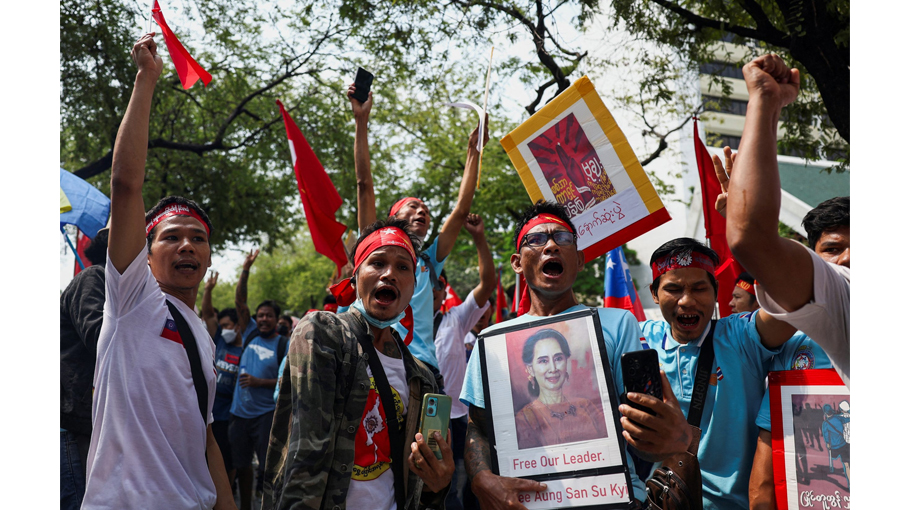Myanmar tragedy raises troubling questions about a better future

Myanmar had another terrible year in 2023. The economic, social and political damage unleashed by the 2021 coup is compounded month-by-month by the decisions of a small group of top generals prepared to strangle their country’s hopes for a better future if that means they can stay in charge.
Myanmar’s 55 million people have paid an immense price for Senior General Min Aung Hlaing’s decisions.
These include the decisions to remove Aung San Suu Kyi from power, arrest the president and government ministers, hunt down the resistance and stomp out the democratic prospects of a country that has already missed out on so much economic and social development.
The intensity of violence means that millions of people are traumatised and despairing. Others are radicalised, with total commitment to destroying military rule. They see no hope for themselves or their children in a system where the army feels entitled to destroy inclusive political institutions on a whim.
On the battlefield, in 2023, Myanmar’s armed groups inflicted heavy losses on government forces but were still out-gunned. The generals in Naypyidaw, with their artillery, rockets and air force, are doing horrendous damage nationwide.
At a time when the wars in Eastern Europe and the Middle East are still raging and other potential flashpoints demand constant attention, Myanmar has again slipped from the list of strategic priorities. Even the lightening assaults and territorial gains by rebel groups since October 2023 have only slightly shifted most strategic assessments.
Could this year be any different? After three years of resistance and violence, the military regime has yet to consolidate its authority fully — it has no real friends internationally, and China and Russia only care enough to pursue their own financial and strategic goals. With rock-bottom morale, keeping enough of the regime’s own troops and police in the fight is not a foregone conclusion. And, perhaps most perilously, the self-inflicted wounds of the coup have seen the domestic economy deteriorate sharply.
Increasingly draconian restrictions mean that even those who grudgingly consented to the coup — and who may have expected a return to the old days of stifling military dominance — are left wondering if there is any point going along with what is a profoundly worrying spiral towards the autocratic abyss.
In 2023, the broader regional security risks became even more apparent.
Myanmar became the world’s top source of opium, adding to its long ascendency as a methamphetamine producer. The rising scourge of Myanmar-hosted cyber-scams, some located in the borderlands where Chinese crime syndicates are flourishing, present another set of issues. A failing state is an engine for all sorts of problems. With the generals in Naypyidaw now feeling under more pressure than ever, with the battlespace changing rapidly, and with Myanmar even more isolated than usual internationally, questions about what happens next are starting to get more attention.
Planning for different scenarios is now prudent. The first focus of discussion needs to be the future of Myanmar’s many armed groups, including Senior General Min Aung Hlaing’s army that launched the 2021 coup.
As the country’s dominant political institution since independence in 1948, it now faces a long list of alleged war crimes and frets more than ever about its own security. It is hard to imagine a negotiated settlement that could include the current military leadership. If Naypyidaw is attacked and risks being overrun, their last option would be sanctuary in ignominious exile.
And then what? The big problems in any ‘day after’ scenarios are about equitably sharing power and resources between the countless groups that have fought so hard to defeat the coup.
They are understandably eager to carve out spheres of authority, experiment with self-government and secure a share of the country’s vast resource wealth.
Contemplating the country’s balkanisation, something many are reluctant to do, also means thinking more deeply about how such fractured societies would eventually heal.
Institution-building across multiple jurisdictions, including in any looser federal model, would be time-consuming and expensive.
This is where hypothetical discussion about Myanmar’s future takes on graver implications and deserves much more attention from outside.
Its people have fought hard for a chance to destroy the military’s oppressive apparatus. Yet without a change in approach from the rest of the world, the reality is that the Myanmar people will continue to fight on, mostly alone.
If the military regime eventually fails — meaning that the coup-makers have their backs to the wall — the hard work of the Myanmar people will continue, including across what are often competing ethnic, religious and ideological lines. Those who come out on top will need strong international backers.
While the Myanmar people should have every opportunity to determine their own futures, in any ‘day after’ scenarios, ASEAN and other international actors would need to step up rapidly and proactively.
Democratic partners like Australia and Japan should be ready to assist with resources and collaborative ambition.
The costs and other demands of a serious plan to support Myanmar after the current disaster will be immense, and Myanmar’s democrats need all the friends they can get.
Nicholas Farrelly is Professor and Pro
Vice-Chancellor at the University of Tasmania.
Source: East Asia Forum




